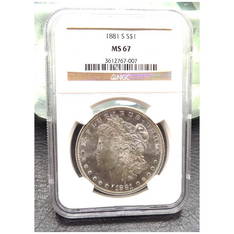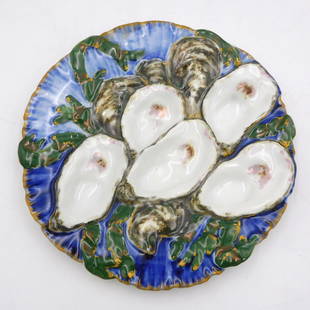
Woodrow Wilson TLS Re: Prohibiting American Shipbuilders to Sell Wooden Ships to "foreign interests"
Similar Sale History
View More Items in Presidential & First Lady Memorabilia

Related Presidential & First Lady Memorabilia
More Items in Presidential & First Lady Memorabilia
View MoreRecommended Historical Memorabilia
View More



Item Details
Description
Woodrow Wilson
Washington, D.C., September 9, 1918
Woodrow Wilson TLS Re: Prohibiting American Shipbuilders to Sell Wooden Ships to "foreign interests"
TLS
A 1p typed letter signed by 28th U.S. President Woodrow Wilson (1856-1924) as "Woodrow Wilson" at lower right. September 9, 1918. Washington, D.C. Typed in blue ink on watermarked stationery once bifold but now with the page separated along the crease. "The White House / Washington" is embossed at the letterhead. Expected wear including flattened transmittal folds. Scattered clerical holes located along the top edge, with an isolated paperclip impression at top and minor edge loss at bottom left. Isolated pencil inscriptions by a former collector located at bottom right. Minor feathering and haloing to Wilson's signature. Else very good to near fine. 7" x 8.875."
President Wilson wrote this letter to Edward Nash Hurley (1864-1933), Chairman of the U.S. Shipping Board (U.S.S.B.), in part:
"I am in a quandary about what to reply to your letter of September 7th [not included in this lot] about the wooden ships which the Rolph Shipbuilding Company of San Francisco wishes to sell. My judgment in general terms is that it is not wise to sell to anybody at present, and that it is in particular unwise to sell to a corporation which we know to be controlled by foreign interests, and yet I hesitate to advise that the Shipping Board assume the burden of purchasing the ships in question. Would it be unfair to the Rolph Company to say just this: that we feel obliged to insist that sales be made only to out and out American interests, and that if they choose to sell to such interests we shall make no objection?"
The question of who should benefit from American shipping had plagued the United States since its declaration of war in April 1917. During a wartime emergency, it was imperative that each and every resource was reserved for the American war machine. In addition, the United States had reservations about selling to or ceding control of American shipping to foreign interests, even their allies. Selling to some foreign nations and not to all risked showing favoritism, which was bad from a diplomatic perspective; while selling also meant that, after the war, when the conflict had ended and things went back to normal, the United States would have armed its future rivals.
The Rolph Shipbuilding Company was founded by James "Sunny Jim" Rolph, Jr. (1869-1934), a talented California businessman with varied interests in banking, transport, and commerce who would serve as the Mayor of San Francisco from 1912-1931, and as the Governor of California during the 1930s. The Rolph Shipbuilding Company had a contract with the U.S.S.B. to supply some of the 1,000 wooden ships estimated to be required to transport American troops, supplies, and equipment to the European Theatre. The Rolph Shipbuilding Company constructed a total of nine vessels which were delivered to the U.S.S.B. from 1918-1919; one, the 1,300-odd ton barquentine "Hesperian," was delivered on September 9, 1918, the very day Wilson wrote this letter.
James Rolph, Jr., patriotism aside, wished to offer his wooden ships to other entities besides the U.S.S.B. With three shipyards at his disposal in Oakland, San Francisco, and Rolph (modern day Fairhaven), California, Rolph could scale up production and sell his shipping abroad. In February 1918, Rolph had requested permission from the U.S.S.B. to sell his ships to the French government, a claim that was later rejected for "diplomatic reasons." Rolph lobbied his case in Washington, D.C. to little avail. After the war ended, Rolph's shipyards were over-extended and not a little obsolete.
The Rolph Shipbuilding Company was just one of dozens of American shipbuilders--clustered up and down the coasts, the Gulf of Mexico, and the Great Lakes--to receive U.S.S.B. contracts for wooden ship construction. Only a fraction of the 1,000 wooden ships were completed and delivered; the remainder were only partially constructed or had not even been begun. The unfinished wooden ships were either sold off, scrapped, or burnt in place, because steel had already replaced wooden ships as the standard in military transport.
This item comes with a Certificate from John Reznikoff, a premier authenticator for both major 3rd party authentication services, PSA and JSA (James Spence Authentications), as well as numerous auction houses.
WE PROVIDE IN-HOUSE SHIPPING WORLDWIDE!
7" x 8.875"
Washington, D.C., September 9, 1918
Woodrow Wilson TLS Re: Prohibiting American Shipbuilders to Sell Wooden Ships to "foreign interests"
TLS
A 1p typed letter signed by 28th U.S. President Woodrow Wilson (1856-1924) as "Woodrow Wilson" at lower right. September 9, 1918. Washington, D.C. Typed in blue ink on watermarked stationery once bifold but now with the page separated along the crease. "The White House / Washington" is embossed at the letterhead. Expected wear including flattened transmittal folds. Scattered clerical holes located along the top edge, with an isolated paperclip impression at top and minor edge loss at bottom left. Isolated pencil inscriptions by a former collector located at bottom right. Minor feathering and haloing to Wilson's signature. Else very good to near fine. 7" x 8.875."
President Wilson wrote this letter to Edward Nash Hurley (1864-1933), Chairman of the U.S. Shipping Board (U.S.S.B.), in part:
"I am in a quandary about what to reply to your letter of September 7th [not included in this lot] about the wooden ships which the Rolph Shipbuilding Company of San Francisco wishes to sell. My judgment in general terms is that it is not wise to sell to anybody at present, and that it is in particular unwise to sell to a corporation which we know to be controlled by foreign interests, and yet I hesitate to advise that the Shipping Board assume the burden of purchasing the ships in question. Would it be unfair to the Rolph Company to say just this: that we feel obliged to insist that sales be made only to out and out American interests, and that if they choose to sell to such interests we shall make no objection?"
The question of who should benefit from American shipping had plagued the United States since its declaration of war in April 1917. During a wartime emergency, it was imperative that each and every resource was reserved for the American war machine. In addition, the United States had reservations about selling to or ceding control of American shipping to foreign interests, even their allies. Selling to some foreign nations and not to all risked showing favoritism, which was bad from a diplomatic perspective; while selling also meant that, after the war, when the conflict had ended and things went back to normal, the United States would have armed its future rivals.
The Rolph Shipbuilding Company was founded by James "Sunny Jim" Rolph, Jr. (1869-1934), a talented California businessman with varied interests in banking, transport, and commerce who would serve as the Mayor of San Francisco from 1912-1931, and as the Governor of California during the 1930s. The Rolph Shipbuilding Company had a contract with the U.S.S.B. to supply some of the 1,000 wooden ships estimated to be required to transport American troops, supplies, and equipment to the European Theatre. The Rolph Shipbuilding Company constructed a total of nine vessels which were delivered to the U.S.S.B. from 1918-1919; one, the 1,300-odd ton barquentine "Hesperian," was delivered on September 9, 1918, the very day Wilson wrote this letter.
James Rolph, Jr., patriotism aside, wished to offer his wooden ships to other entities besides the U.S.S.B. With three shipyards at his disposal in Oakland, San Francisco, and Rolph (modern day Fairhaven), California, Rolph could scale up production and sell his shipping abroad. In February 1918, Rolph had requested permission from the U.S.S.B. to sell his ships to the French government, a claim that was later rejected for "diplomatic reasons." Rolph lobbied his case in Washington, D.C. to little avail. After the war ended, Rolph's shipyards were over-extended and not a little obsolete.
The Rolph Shipbuilding Company was just one of dozens of American shipbuilders--clustered up and down the coasts, the Gulf of Mexico, and the Great Lakes--to receive U.S.S.B. contracts for wooden ship construction. Only a fraction of the 1,000 wooden ships were completed and delivered; the remainder were only partially constructed or had not even been begun. The unfinished wooden ships were either sold off, scrapped, or burnt in place, because steel had already replaced wooden ships as the standard in military transport.
This item comes with a Certificate from John Reznikoff, a premier authenticator for both major 3rd party authentication services, PSA and JSA (James Spence Authentications), as well as numerous auction houses.
WE PROVIDE IN-HOUSE SHIPPING WORLDWIDE!
7" x 8.875"
Buyer's Premium
- 28%
Woodrow Wilson TLS Re: Prohibiting American Shipbuilders to Sell Wooden Ships to "foreign interests"
Estimate $300 - $400
2 bidders are watching this item.
Shipping & Pickup Options
Item located in Wilton, CT, usOffers In-House Shipping
Local Pickup Available
Payment
Accepts seamless payments through LiveAuctioneers

Auction Curated By

President
Related Searches
TOP

















































![John F. Kennedy White House used coffee table: [KENNEDY, JOHN F.] Coffee table used in Kennedy White House. A rectangular mahogany coffee table by Drexel (with their stencil markings), with a central drawer and fluted legs, about 59 inches (L) x 1](https://p1.liveauctioneers.com/292/326828/175963031_1_x.jpg?height=310&quality=70&version=1713473479)



















